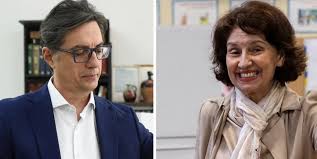In North Macedonia, the first round of the presidential elections took place on Wednesday. Unlike in Ukraine, where elections are held on weekends, here it happens on weekdays. Although this country is not in the limelight of Ukrainian news, a lot depends on the outcome of these elections for Ukrainians. To find out why, read on in the article.
Historical Kinship
Despite the territorial distance, North Macedonia does not consider Russia’s war against Ukraine as “not its war,” and several factors contribute to this view. The reason is that it is one of the successor states of Yugoslavia, which, like Ukraine, gained independence in 1991.
It is well acquainted with conflicts:
– It borders partially recognized Kosovo in the northwest, where several conflicts have occurred in recent decades;
– It borders Serbia to the north, also a party to a series of wars;
– It borders Albania to the west, where military unrest with the use of a military arsenal and firearms has taken place.
The last similar conflict on the territory of North Macedonia occurred about 20 years ago when the Albanian army attacked the Macedonian security forces.
Common Threat
During the USSR existence, North Macedonia within Yugoslavia was in the Soviet Union’s sphere of influence. Although the communists in power somehow managed not to be signatories of the Warsaw Pact, they were still considered by the Kremlin as important appendages of its regime. The situation has not changed significantly now: like all the Balkans, the state is viewed by the Putin regime as a desirable piece, relatively easy to acquire.
Recognizing all the risks, North Macedonia is among the top four NATO allies in terms of military support to Ukraine per capita. They understand that the losses from supporting Kyiv are not only smaller than in a conflict on their own territory but could also be significant for the country’s future existence if Russia goes further through the Balkans.
That’s why it is important for Ukrainians to know which forces are in power in this country.
First act
In the first round, the victory went to Gordana Siljanovska-Davkova – the opposition candidate who received 40% of the votes. The incumbent president Stevo Pendarovski also participated in the elections, but he received only half as many votes – just 20%. In third place was the Minister of Foreign Affairs, Bujar Osmani, with a result of 13.6%.
In the second round, the oppositioner and the current president will face off. His advantage is that he is 9 years younger than his opponent – she is 70 years old, and he is 61. He also counts on support in the second round from the ethnic minority from Albania, which makes up 25% of the population of North Macedonia.
The expectations of the Macedonians for both candidates are approximately the same: they hope that the chosen one will be able to make the country a member of the European Union. The process began back in 2005, and in 2022, talks on accession were initiated.
In the Ukrainian issue, the current President Stevo Pendarovski is currently placing a special emphasis. For example, a joint Declaration on Ukraine’s European integration was recently signed by Kyiv and Skopje. It is noted that Gordana Siljanovska-Davkova does not hold opposing views on this issue.
The second round of elections is scheduled for May 8, when the fate of the country for the next five years will be decided.


